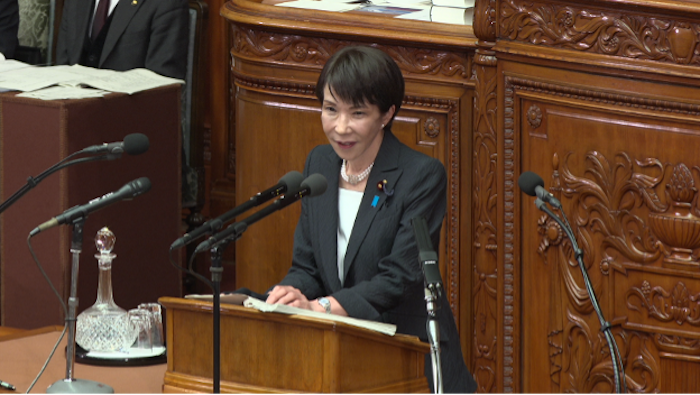
by Editor BGF | Feb 22, 2026 | Shinzo Abe Initiative for Peace and Security, News
On February 18, 2026, Japan entered a transformative era as Sanae Takaichi was officially designated the nation’s 105th Prime Minister. Following the Liberal Democratic Party’s (LDP) landslide victory on February 8, PM Takaichi used her inaugural Diet address to set a bold, proactive tone for Japan’s future, focusing on economic revitalization, national security, and global AI leadership.
This domestic momentum now shifts to the international stage with the March 19, 2026, Washington Summit, hailed as the most significant diplomatic event of the decade. The summit serves as the formal unveiling of the Japan-U.S. “New Golden Age”—a framework integrating economic security, AI innovation, and the Social Contract for the AI Age.
1. The March 19 Summit Agenda: A Historic Reception
- State Guest Honors: President Trump will welcome PM Takaichi as a State Guest with a full ceremony and official dinner. This high-level choreography underscores the “limitless” potential of the alliance following her decisive electoral mandate.
- The “America at 250” Tribute: Japan will take center stage in the U.S. 250th-anniversary celebrations. PM Takaichi will formally present 250 cherry trees to the American people, symbolizing a renewed and enduring friendship for the next century.
2. Anchoring the AIWS Social Contract
The summit will act as a strategic bridge to the Harvard AIWS Summit on May 1st, focusing on:
- The “Gennai” & AIWS Synergy: Harmonizing Japan’s new Fundamental Plan for AI (Gennai) with the AIWS Social Contract. The goal is to move from theory to practice by implementing shared standards for AI Trust and Transparent Algorithms.
- Human-Centric Governance: Both leaders are expected to affirm a joint vision for AI that upholds human dignity and individual data rights, creating a democratic alternative to “Digital Authoritarianism.”
3. The $550 Billion “Prosperity Bridge”
The leaders will finalize specific projects under Japan’s massive investment pledge to the U.S. economy:
- Semiconductor Resilience: Joint ventures in 2-nanometer chip production to secure the hardware foundation of the global AI stack.
- Critical Minerals: A new bilateral framework for stockpiling and processing rare earths and lithium to ensure supply chain independence.
4. Security & The “JESTA” Framework
Building on her proactive security stance, PM Takaichi will discuss integrating Japan’s new JESTA (Japan Electronic System for Travel Authorization) with U.S. border technologies. This creates a “Trusted Corridor”, utilizing AI for high-speed, high-security migration management between the two nations.


by Editor BGF | Feb 21, 2026 | News
On February 20, 2026, the U.S. Supreme Court issued a landmark 6-3 ruling striking down President Donald Trump’s “reciprocal” global tariffs. The Court ruled that the administration exceeded its authority by using the International Emergency Economic Powers Act (IEEPA) to bypass Congress’s constitutional power over taxes and trade.
In response, Treasury Secretary Scott Bessent appeared on Fox News to outline the administration’s strategy moving forward:
1. The “Draconian Alternative”
Bessent argued that while the Court restricted specific tariffs under IEEPA, it reaffirmed the President’s right to a complete embargo.
- The Leverage: Bessent noted, “The Court has made the President’s leverage more draconian… he does have the right to a full embargo. He can just cut countries off or cut whole product lines off.”
2. Seamless Transition: “The Toolbox is Full”
The administration plans to maintain tariff levels using alternative legal authorities:
- Section 122 (Trade Act of 1974): Used immediately to sign an executive order for a 10% global tariff (valid for 150 days).
- Sections 232 & 301: These security-focused authorities remain intact to ensure trade goals are met without interruption.
3. Economic Stability & Growth
Despite the ruling, Bessent projected confidence, stating that 2026 revenue estimates remain “virtually unchanged.” The administration continues to target 3.5% growth through its “parallel prosperity” agenda, linking trade, tax, and energy policy.
4. The Refund Contention
With $133B–$175B in collected tariffs now potentially illegal, a “convoluted” battle for refunds looms. Bessent signaled that the refund process could take years, urging partners to honor existing trade agreements rather than seeking immediate repayments.

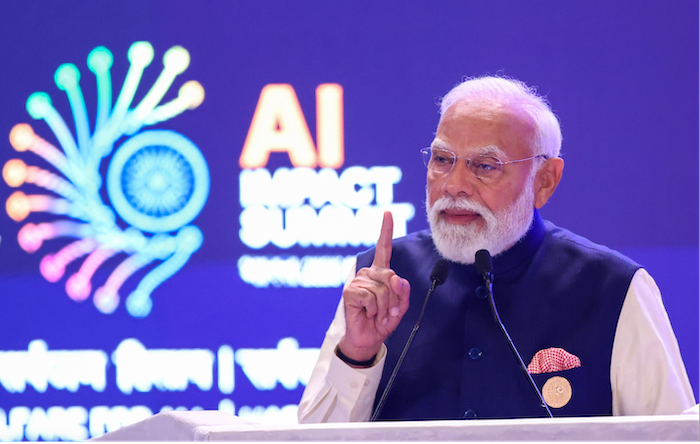
by Editor BGF | Feb 22, 2026 | News, Shaping Futures
The AI Impact Summit India 2026 marked a visible turning point in the global AI conversation: the world is moving beyond celebrating capability toward demanding measurable impact—in health, education, productivity, public services, and human security. As AI becomes embedded in the operating systems of society, the decisive question is no longer “How powerful is the model?” but “Can institutions and citizens trust the outcomes—and correct them when they fail?”
India’s convening role at this summit is especially significant. It reflects the emergence of a new center of gravity for the AI era: large democracies that must deliver innovation at scale while protecting inclusion, rights, and social stability. The Summit’s message is clear: AI’s legitimacy will be earned not through promises, but through governance that works in real life.
BGF Announcement: AIWS Impact Components in Boston and Nha Trang
Against this backdrop, the Boston Global Forum (BGF) announced two “AIWS Impact” components, designed to be demonstrated, piloted, and scaled through Boston and Nha Trang as living laboratories of democratic innovation:
- AIWS Trust Rating
- AIWS Trust Infrastructure
Together, they operationalize a simple principle for the AI age: trust must be measurable, comparable, and enforceable—so that AI markets can grow without sacrificing safety, rights, or democratic legitimacy.
AIWS Trust Rating
Concept
AIWS Trust Rating is a public, evidence-based rating system that answers the first question citizens, regulators, and institutions now ask:
“Can we trust this AI system in real conditions, for this specific use?”
It shifts evaluation from marketing claims and benchmark scores to accountability performance. Like safety ratings in transportation or reliability standards in critical infrastructure, AIWS Trust Rating provides a shared language that makes risk legible and governance actionable.
Principles
- Evidence over claims: ratings depend on documented testing, audits, monitoring results, and incident history.
- Use-case specificity: trust is rated by domain (health, education, finance, public services), not by hype.
- Continuous updating: ratings evolve as models change, data drifts, or new risks emerge.
- Comparability across borders: a common scale supports procurement, investment, and cooperation.
- Human rights by design: privacy, fairness, transparency, and accountability are treated as baseline requirements.
What it measures (core dimensions)
Safety and robustness; transparency and documentation; fairness and bias controls; privacy and data governance; auditability and traceability; human oversight; incident response readiness; and redress capacity.
The purpose is not to slow innovation. The purpose is to make trustworthy innovation faster—by giving institutions a credible way to choose systems that meet the standards of democratic society.
AIWS Trust Infrastructure
Concept
If AIWS Trust Rating makes trust visible, AIWS Trust Infrastructure makes trust operational. It is a full-stack framework that turns AI governance from aspirational ethics into day-to-day institutional practice—across vendors, sectors, and jurisdictions.
AIWS Trust Infrastructure treats trust as a form of public-interest infrastructure: built into the lifecycle of AI from design to deployment, from monitoring to incident response, from remedy to learning. In the AI age, trust cannot be an afterthought; it must be engineered.
Principles
- Trust as infrastructure: embedded like safety engineering in aviation and medicine.
- End-to-end accountability: design → deployment → monitoring → incident response → remedy.
- Audit-ready by default: logs, documentation, and evaluation artifacts are continuously produced and preserved.
- Interoperable governance: supports cross-institution adoption and trusted AI markets.
- Redress is mandatory: when harm occurs, systems must enable correction, compensation pathways, and prevention of recurrence.
Core components (the infrastructure layer)
- Standards and governance controls: clear roles, thresholds, approvals, and risk responsibilities.
- Evaluation and monitoring: pre-deployment testing plus continuous real-world monitoring.
- Traceability: model/data lineage, versioning, audit logs, and decision records.
- Incident reporting and response: classification, escalation, rollback/patch protocols.
- Remedy playbooks: standard corrective actions and accountability steps.
- Institutional enforcement mechanisms, including the AIWS Tribunal as a credible pathway for mediation/arbitration and public-interest accountability opinions.

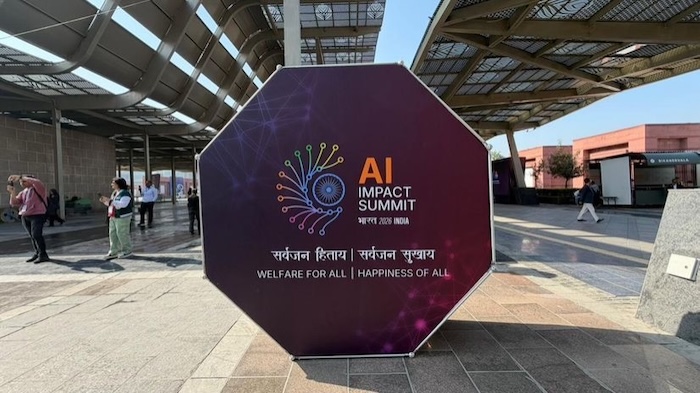
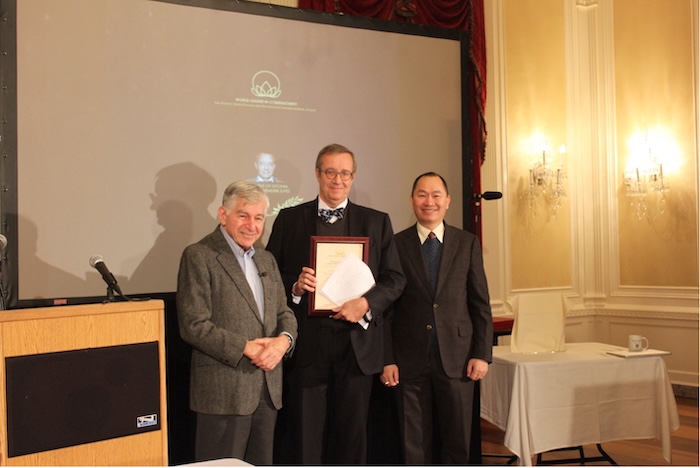
by Editor BGF | Feb 22, 2026 | News
A historic milestone in the AI age
As AI became powerful enough to influence elections, finance, education, healthcare, and security, a new reality emerged: capability without trust is instability. AIWS Trust Rating marks a historic shift in the development of AI—moving the world from “AI performance” to AI accountability. It is a practical, public-facing way to answer the question citizens and institutions now ask first: Can this AI system be trusted—by evidence, not by marketing?
AIWS Trust Rating introduces a common language for trust across borders and sectors. It evaluates AI systems and deployments against measurable requirements—such as transparency, safety testing, bias and fairness controls, auditability, data governance, human oversight, incident response readiness, and redress mechanisms. In historical terms, it is to the AI age what credit ratings and safety standards were to earlier eras of industrial growth: a mechanism that makes complex risk legible, comparable, and governable.
AIWS Trust Infrastructure
The moment trust becomes “infrastructure for all infrastructure”
If the Trust Rating makes trust visible, AIWS Trust Infrastructure makes trust operational. This is the deeper historical event: the creation of an institutional and technical foundation that allows trustworthy AI to scale—without sacrificing rights, safety, or democratic legitimacy.
AIWS Trust Infrastructure connects four elements into a single system:
- Standards and norms (what trustworthy AI must mean in practice)
- Continuous evaluation (testing, monitoring, and updating under real-world conditions)
- Accountability mechanisms (audit logs, documentation, traceability, and governance controls)
- Redress and remedy (incident reporting, corrective actions, and enforceable commitments
In the narrative of AI history, AIWS Trust Rating and AIWS Trust Infrastructure represent a turning point: the transition from an age of rapid invention to an age of civilizational governance—where societies build the tools to ensure AI advances human dignity, social stability, and inclusive prosperity.
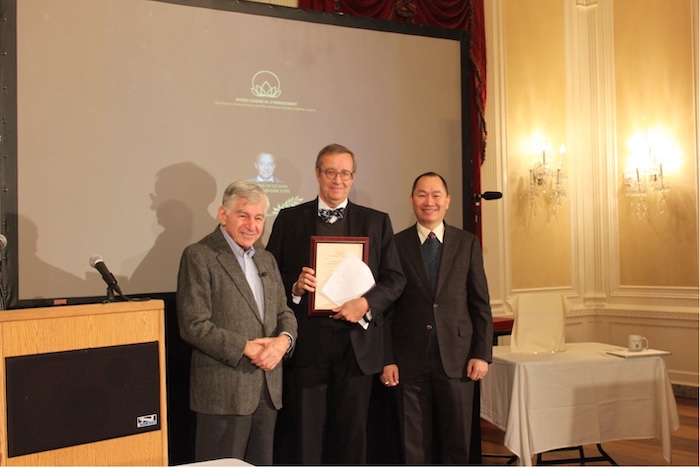
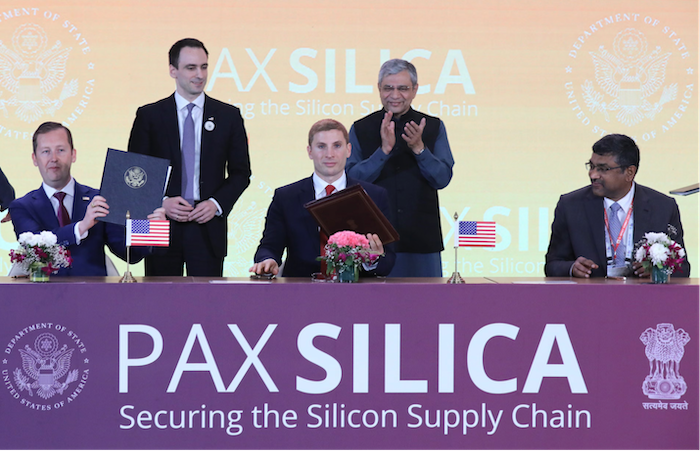
by Editor BGF | Feb 22, 2026 | Global Alliance for Digital Governance
On February 19, 2026, at the India AI Impact Summit 2026 in New Delhi, Michael Kratsios, Director of the White House Office of Science and Technology Policy, delivered a landmark address outlining a transformative U.S. strategy for the “AI Age.” His remarks signaled a decisive shift in American AI diplomacy—moving away from “safety-first” paralysis toward a paradigm of AI Sovereignty and Economic Opportunity.
1. Rejection of Global Governance
In his most direct statement to date, Kratsios declared, “We totally reject global governance of AI.” He argued that centralized, bureaucratic control at the international level (such as UN-led initiatives) risks stifling innovation and becoming a tool for “tyrannical control.” Instead, he advocated for local, use-case-specific regulation that empowers nations to chart their own destinies.
2. Defining “Real AI Sovereignty”
Kratsios introduced a pragmatic definition of AI Sovereignty for the modern era:
- Strategic Autonomy, Not Isolation: He noted that complete technological self-containment is unrealistic due to the complexity of the AI stack.
- Leveraging the Best: Real sovereignty means owning and using “best-in-class” technology—specifically the American AI stack—to benefit one’s own people while maintaining national control over data and policy.
3. Shift from “Fear” to “Hope”
Criticizing international forums for maintaining an “atmosphere of fear” regarding speculative risks, Kratsios urged a transition from “AI Safety” to “AI Impact.” He emphasized that AI should be viewed as a foundation for abundance, warning against letting it become “abandoned and unrealized,” much like the missed potential of nuclear power in previous decades.
4. The American AI Exports Program
To catalyze global adoption, Kratsios highlighted the American AI Exports Program, a whole-of-government initiative including:
- National Champions Initiative: Integrating partner nations’ leading companies into the American technology ecosystem.
- S. Tech Corps: A new “Peace Corps-style” model deploying volunteer technical experts to provide last-mile support for AI in public services.
- Global Financing: New funding via the World Bank, EXIM Bank, and the DFC to help developing nations overcome infrastructure costs.
5. The Pax Silica Declaration
A major summit milestone was the signing of the Pax Silica Declaration and a bilateral “AI Opportunity Partnership” between the U.S. and India. This agreement pledges a global approach to AI that is “unapologetically friendly to entrepreneurship” and focuses on securing the physical silicon stack.
https://www.whitehouse.gov/articles/2026/02/remarks-by-director-michael-kratsios-at-the-india-ai-impact-summit/


by Editor BGF | Feb 15, 2026 | News
Happy Lunar New Year 2026 (Bính Ngọ)!
In the light of spring, the BGF–AIWS Family sends our warmest wishes to friends, partners, and communities worldwide for peace, well-being, happiness, and creativity. As the world moves rapidly into the AI Age, we must hold onto what matters most: human dignity, compassion, and trust.
With this spirit, in 2026 we hope to advance practical ideas and actions that help AI become a force for peace, prosperity, and human warmth:
- AIWS Angel — Awakening the Warm Human Heart
Encouraging care, closeness, and real presence—technology as a bridge between people.
- Angel Mai Vàng Festival — Human Warmth in the AI Age
Beginning in Nha Trang and spreading a New Year ritual: “put the phone down—hold hands,” celebrating kindness and reconciliation.
- America at 250 — A Beacon for the AI Age (initiative and book by Governor Michael Dukakis and Nguyen Anh Tuan)
Contributing ideas and solutions so the U.S. and democracies lead with norms, trust, and human-centered innovation.
- AI Governance 24/7 — Transparent, Service-Centered Government (AIWS Government 24/7)
Advancing responsible AI governance: safety, transparency, and accountability that improves public services.
- AI for Health & Well-Being (AIWS Health)
Early diagnosis, remote care, hospital optimization—bringing quality healthcare closer to everyone.
- AI for Education & Opportunity (AIWS Education)
Reskilling workers and expanding access to knowledge so no one is left behind in the AI transition.
- Deepfake Defense — Protecting Truth and Democracy
Content provenance, election protection, and reduced manipulation—strengthening the foundations of shared reality.
- A Trusted Indo-Pacific Norms Alliance (Indo-Pacific Spark)
S.–Japan as a pillar, with standards-based engagement with ASEAN and India—building a trusted zone for AI and digital infrastructure.
- A New Economy for the AI Age — Inclusive Prosperity (AIWS DASI)
Human-centered development that expands opportunity and reduces inequality.
- Culture, Music, and Arts for Humanity (AIWS Film Park – including the Shinzo Abe Film)
Keeping the world warm: arts as a universal language of compassion.
This Lunar New Year, we renew a promise:
AI will not replace people—AI will elevate humanity: more creative, more compassionate, and more connected.
Wishing everyone a New Year of peace, warmth, and meaningful progress.
BGF–AIWS Family

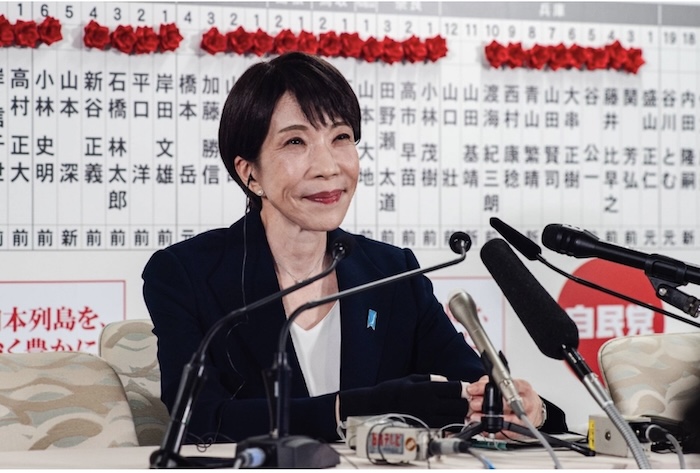
by Editor BGF | Feb 15, 2026 | Shinzo Abe Initiative for Peace and Security, News
The “Sana-mania” that swept Japan on February 8, 2026, has not only reshaped the halls of the Diet but has also ignited a geopolitical and economic shift that many are calling the definitive evolution of the Abe legacy. By securing 316 seats—a staggering two-thirds supermajority—Prime Minister Takaichi has moved with “lightning speed” to consolidate a vision that is as much about national dignity as it is about economic survival.
I. Economic Sovereignty: Beyond Abenomics
While the late Shinzo Abe broke the cycle of deflation, Takaichi is tackling the “inflationary era” with a bolder, more interventionist hand. Her first executive decree signaled the immediate implementation of her campaign promise:
- The Food Tax Suspension: In a move that stunned fiscal hawks but delighted the public, she initiated the two-year freeze on the 8% consumption tax for food items. This serves as a primary shock absorber for the cost-of-living crisis.
- The 2026 “Strategic Growth” Budget: Takaichi has bypassed traditional austerity by introducing a record ¥122 trillion budget. It prioritizes “Sanaenomics” pillars: massive state-led investment in AI, quantum computing, and all-solid-state batteries, aiming to decouple Japan’s critical supply chains from adversarial influence.
II. A “Normal” Nation: Defense and Constitutional Clarity
If Abe opened the door to collective self-defense, Takaichi is walking through it. Following her victory, her first security-related actions have been unmistakably clear:
- Updating the “Three Strategic Documents”: She has ordered an immediate revision of the National Security Strategy to reflect a “forward” posture.
- The Taiwan Strait Stance: Abandoning “strategic ambiguity,” Takaichi reaffirmed that a contingency in Taiwan is a “survival-threatening situation” for Japan, effectively locking in deeper military integration with the U.S. and preparing for the formal recognition of the Self-Defense Forces as a national military.
- Intelligence Centralization: She has moved to establish a National Intelligence Organization, a long-sought goal of the conservative wing to professionalize Japan’s counter-espionage and data-gathering capabilities.
III. Diplomatic Realignment: The “Trump-Takaichi” Axis
Takaichi’s first diplomatic outreach was a high-profile call with President Donald Trump. The “special chemistry” reported between the two leaders suggests a return to the personal diplomacy seen during the Abe-Trump years, but with a sharper edge regarding China. Takaichi has signaled that Japan will no longer be a “normative partner” for the West, but a “strategic actor” that expects reciprocity in defense and technology sharing.
“The Takaichi Cabinet will put an end to the trend toward excessive austerity and under-investment in the future. We will work, work, and work to make Japan strong again.” > — PM Takaichi, Victory Address, Feb 9, 2026

Screenshot
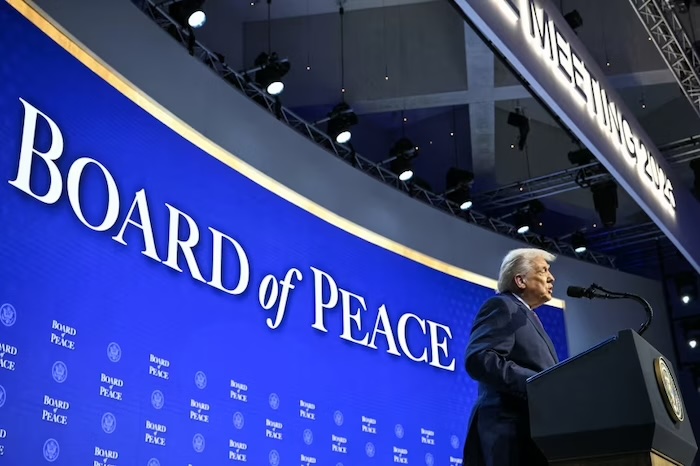
by Editor BGF | Feb 15, 2026 | News, Shaping Futures
As the Board of Peace—a U.S.-led international initiative launched by President Donald Trump and described by U.S. officials as operating within a UN Security Council–backed framework—convenes its first formal leaders’ meeting on Thursday, February 19, 2026, in Washington, global attention will focus on Gaza’s postwar future. The meeting is expected to be chaired by President Trump and to draw more than 20 participating countries, including regional Middle East partners and a number of emerging nations. Israeli Foreign Minister Gideon Sa’ar is confirmed to attend, while Prime Minister Benjamin Netanyahu is reported to be participating remotely or not attending in person.
The gathering is scheduled to take place at the former U.S. Institute of Peace building—reported in recent coverage as renamed by the administration, though aspects of the change have been described as contested and unresolved in court.
Key expectations and focus areas
- Reconstruction funding announcements: President Trump is expected to unveil a multi-billion-dollar Gaza reconstruction plan and press members for additional pledges, as part of the post-ceasefire implementation track.
- International stabilization force:S. officials have said plans will be presented for a UN-authorized International Stabilization Force intended to help secure Gaza during a transitional period. Key open questions include troop contributors, command arrangements, rules of engagement, and alignment with Israeli security requirements.
- Governance and security roadmap: Delegations are expected to discuss transitional governance mechanisms, humanitarian access and logistics, reconstruction sequencing, and longer-term political parameters—including how demilitarization goals and Palestinian self-determination are addressed in practice.
- Regional dynamics and legitimacy tests: Participation by Arab and Muslim member states is widely viewed as contingent on credible progress in Gaza and Palestinian rights, while some governments remain cautious about how this mechanism relates to existing UN processes and traditional multilateral diplomacy.
This convening is a major test of whether the Board can translate high-level political sponsorship into durable security arrangements, effective reconstruction delivery, and a credible diplomatic pathway for Gaza’s future.
The Boston Global Forum will monitor developments closely and provide updates in subsequent editions.
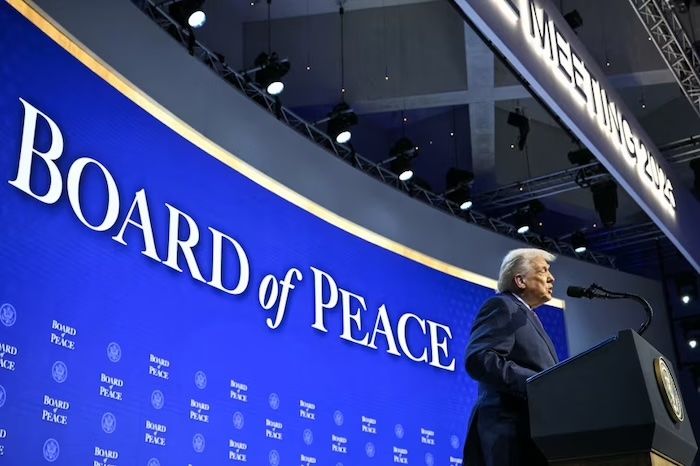
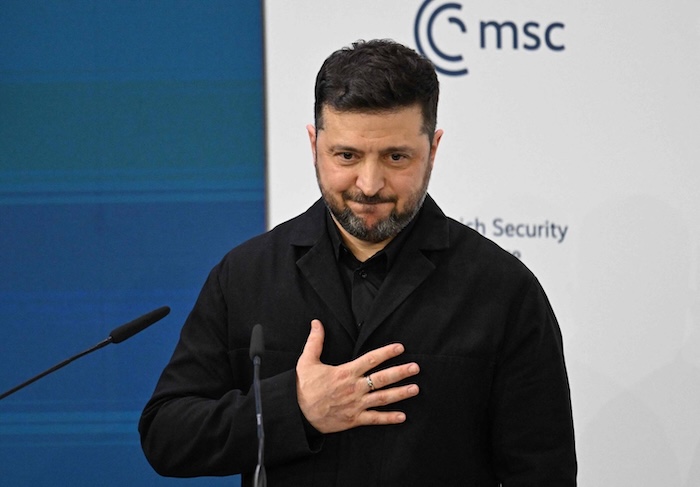
by Editor BGF | Feb 15, 2026 | World Leader for Peace and Security, News
Ukrainian President Volodymyr Zelenskyy was warmly welcomed at the 62nd Munich Security Conference (MSC), held from February 13–15, 2026, at the Bayerischer Hof Hotel and Rosewood Munich. As a prominent figure in global security discussions amid Russia’s ongoing war against Ukraine, Zelenskyy arrived on February 13 and delivered a powerful address on February 14, drawing widespread attention and support from international leaders, delegates, and attendees.
Zelenskyy, recipient of the 2022 World Leader for Peace and Security Award from the Boston Global Forum (BGF) for his steadfast defense of Ukraine’s sovereignty and commitment to democratic values.
The conference, one of the world’s premier forums for international security policy, assembled nearly 50 heads of state and government, over 450 senior decision-makers, and representatives from more than 115 countries. Zelenskyy’s participation included bilateral meetings with U.S. officials (such as Secretary of State Marco Rubio and envoys), European leaders including German Chancellor Friedrich Merz, French President Emmanuel Macron, and British Prime Minister Keir Starmer, as well as discussions on Ukraine’s EU accession aspirations—he expressed hope for readiness by 2027 and stressed the need for a clear timeline.
Delegates and observers greeted Zelenskyy with strong applause during his speech and panel appearances, such as “Coalition of the Able? Securing Long-Term Support for Ukraine.” His messages underscored Ukraine’s push for real security guarantees, Euro-Atlantic integration, and a united front against aggression. Zelenskyy also thanked allies, including the United States under President Donald Trump, for their “constructive approach” in ongoing efforts toward peace negotiations, including preparations for talks in Geneva. The warm reception reflects continued global solidarity with Ukraine nearly four years into the full-scale invasion. As Zelenskyy noted in his address and press interactions, sustained international support remains essential for achieving genuine peace and security in Europe and beyond.
The Boston Global Forum commends President Zelenskyy’s enduring leadership and principled stance, aligning with BGF’s mission to promote peace, ethical governance, and human-centered approaches in an era of global challenges.
















